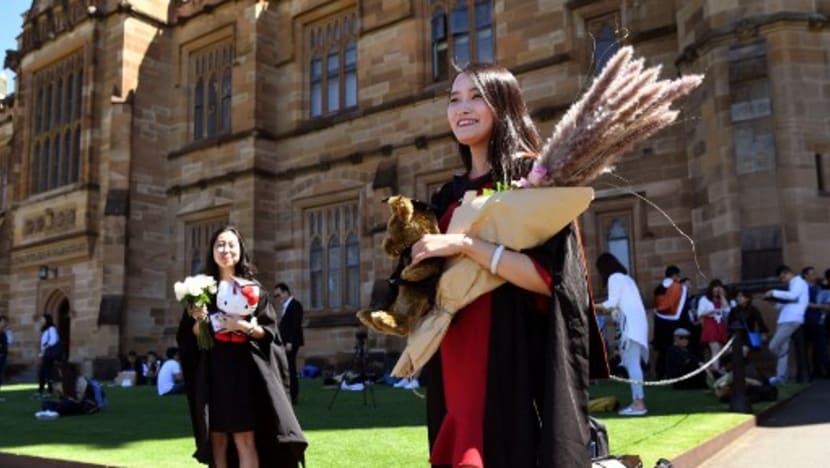Anti-China content being inserted into Chinese students’ overseas university applications, warns spy agency
Chinese students often turn to education consultants for help in their overseas university applications. Authorities are accusing some of these agencies of inserting anti-China content into the documents to boost applicants’ prospects.


This audio is generated by an AI tool.
SINGAPORE: Education consultants are allegedly inserting anti-China content into the overseas university applications of Chinese students to boost their chances of getting admitted.
That’s the charge being made by China’s spy agency, which has criticised the action as “extremely irresponsible” to students while also hurting the country’s image and endangering national security. It did not specify how and why such content would help the students' prospects.
In a notice posted on its official WeChat account on Friday (Aug 9), the Ministry of State Security also asserted some agencies are acting as “accomplices of overseas anti-China forces” by making such moves.
“Foreign anti-China forces have made great efforts to infiltrate our young student groups,” the notice stated.
TAMPERING OF APPLICATION DOCUMENTS
China is the world’s largest source of overseas students. More than 1.02 million Chinese tertiary students were studying abroad in 2021, according to local news outlet China Daily,
It’s common practice for Chinese students to use education consultants to apply for universities abroad, to help navigate unfamiliar education and admissions systems, according to the South China Morning Post (SCMP).
In its notice, the Ministry of State Security acknowledged the support such agencies provide to students, especially in the admission process.
At the same time, it claimed that some hid “private goods” in the applications while adding and tampering with the documents to include “illegal content”.
The ministry provided an example involving a student who bought an “Elite VIP” service from an overseas study agency. It did not specify when the incident took place.
According to the ministry, the agency hired a professional team to tailor a study abroad plan for the student, surnamed Zhang. The person in charge, “Xiao Rui”, told Zhang that a certain country’s tertiary institution had opened a “green channel” for Chinese students who intend to study abroad.
“Xiao Rui” claimed that the application documents needed to be “properly polished” to increase the chances of admission. Instead, the documents ended up being “implanted” with large amounts of false content containing anti-China prejudice and reactionary political speeches, said the ministry.
“Without his knowledge, Zhang went from a student with a simple resume to an anti-China ‘vanguard’ - a victim of this overseas study agency’s illegal behaviour,” the ministry noted.
The agency’s actions ended up catching the attention of national security agencies. After investigations, the agency and its head were dealt with according to the law in May this year, the ministry stated. It did not specify what punishment was meted out.
USING OVERSEAS STUDIES AS “BAIT”
The ministry claimed that in recent years, some countries have been using overseas studies as “bait” to lure students into participating in anti-China activities, even as these nations tighten their foreign student admission policies.
It did not identify or single out any one nation. Western countries are known to be popular picks for Chinese looking to study abroad.
The United Kingdom, United States and Australia were the top three choices this year, according to a report by Chinese educational service provider New Oriental Education & Technology Group as cited by SCMP.
According to a China Daily report in March, there are about 289,000 Chinese students in the US so far this year. This places China on track to be the biggest source of foreign students in the US for the 15th straight year.
Similarly in Australia, a total of 162,826 students came from China alone in the 2022 to 2023 academic year, the Chinese outlet reported, citing a report by the Beijing-based think tank Center for China and Globalization.
The Ministry of State Security criticised some overseas study agencies for having a “weak sense of national security”, protocol lapses, and being fixated on economic gain.
“(These agencies) do not hesitate to cater to anti-China rhetoric and become accomplices of such anti-China forces. (They) mislead students into fabricating false resumes and images, spreading rumours for profit, posing hidden risks that endanger the country’s national security.”
The ministry slammed some agencies for having subpar supervision, leaving room for the “malicious tampering” of application documents. It said lax hiring standards also allow foreign teachers with unverified backgrounds and qualifications to come on board.
These “foreign teachers” reportedly “ghostwrote” or “polished” the application documents of Chinese students to obtain admission advantages and also cater to overseas anti-China forces, the notice wrote.
The ministry concluded by urging overseas students, prospective overseas students and their parents to be vigilant, and be wary of “polishing and processing services” provided by overseas study agencies.
This is not the first time China has warned students studying abroad of national security risks. In February, the country’s spy agency warned Chinese studying abroad against working with foreign spies.
In that alert, Chinese nationals were reminded to be vigilant and avoid contact or cooperating with foreign intelligence agencies - be it studying or travelling overseas, or just paying a visit abroad.















